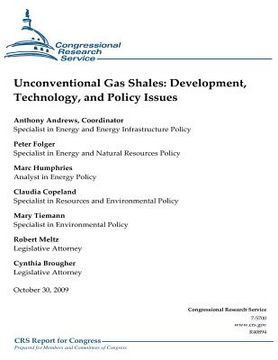Compartir
Unconventional Gas Shales: Development, Technology, and Policy Issues (en Inglés)
Claudia Copeland
(Autor)
·
Peter Folger
(Autor)
·
Marc Humphries
(Autor)
·
Createspace Independent Publishing Platform
· Tapa Blanda
Unconventional Gas Shales: Development, Technology, and Policy Issues (en Inglés) - Folger, Peter ; Humphries, Marc ; Copeland, Claudia
$ 30.080
$ 41.780
Ahorras: $ 11.700
Elige la lista en la que quieres agregar tu producto o crea una nueva lista
✓ Producto agregado correctamente a la lista de deseos.
Ir a Mis Listas
Origen: Estados Unidos
(Costos de importación incluídos en el precio)
Se enviará desde nuestra bodega entre el
Viernes 02 de Agosto y el
Miércoles 14 de Agosto.
Lo recibirás en cualquier lugar de Chile entre 1 y 3 días hábiles luego del envío.
Reseña del libro "Unconventional Gas Shales: Development, Technology, and Policy Issues (en Inglés)"
In the past, the oil and gas industry considered gas locked in tight, impermeable shale uneconomical to produce. However, advances in directional well drilling and reservoir stimulation have dramatically increased gas production from unconventional shales. The United States Geological Survey estimates that 200 trillion cubic feet of natural gas may be technically recoverable from these shales. Recent high natural gas prices have also stimulated interest in developing gas shales. Although natural gas prices fell dramatically in 2009, there is an expectation that the demand for natural gas will increase. Developing these shales comes with some controversy, though. The hydraulic fracturing treatments used to stimulate gas production from shale have stirred environmental concerns over excessive water consumption, drinking water well contamination, and surface water contamination from both drilling activities and fracturing fluid disposal. The saline "flowback" water pumped back to the surface after the fracturing process poses a significant environmental management challenge in the Marcellus region. The flowback's high content of total dissolved solids (TDS) and other contaminants must be disposed of or adequately treated before discharged to surface waters. The federal Clean Water Act and state laws regulate the discharge of this flowback water and other drilling wastewater to surface waters, while the Safe Drinking Water Act (SDWA) regulates deep well injection of such wastewater. Hydraulically fractured wells are also subject to various state regulations. Historically, the EPA has not regulated hydraulic fracturing, and the 2005 Energy Policy Act exempted hydraulic fracturing from SDWA regulation. Recently introduced bills would make hydraulic fracturing subject to regulation under SDWA, while another bill would affirm the current regulatory exemption. Gas shale development takes place on both private and state-owned lands. Royalty rates paid to state and private landowners for shale gas leases range from 121/2% to 20%. The four states (New York, Pennsylvania, Texas, and West Virginia) discussed in this report have shown significant increases in the amounts paid as signing bonuses and increases in royalty rates. Although federal lands also overlie gas shale resources, the leasing restrictions and the low resource-potential may diminish development prospects on some federal lands. The practice of severing mineral rights from surface ownership is not unique to the gas shale development. Mineral owners retain the right to access surface property to develop their holdings. Some landowners, however, may not have realized the intrusion that could result from mineral development on their property. Although a gas-transmission pipeline-network is in place to supply the northeast United States, gas producers would need to construct an extensive network of gathering pipelines and supporting infrastructure to move the gas from the well fields to the transmission pipelines, as is the case for developing any new well field.

